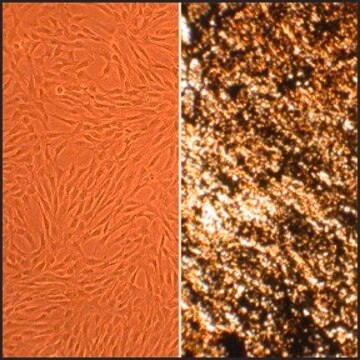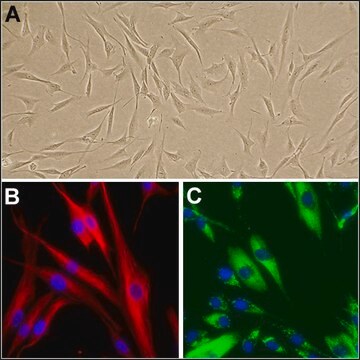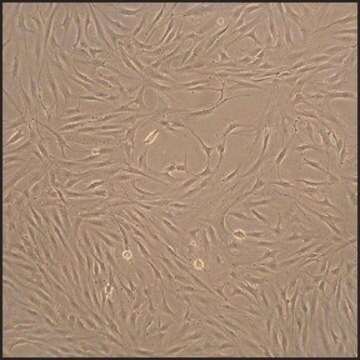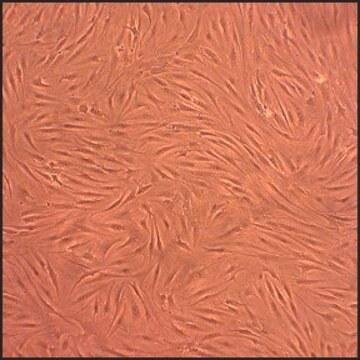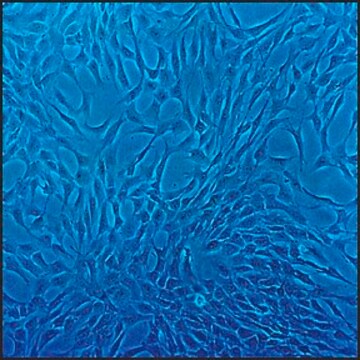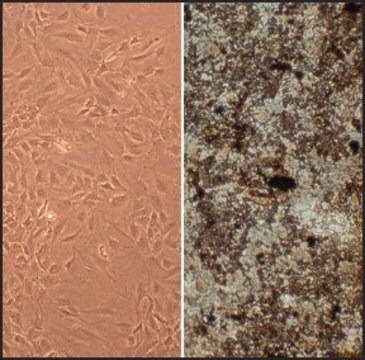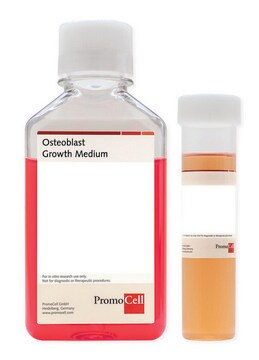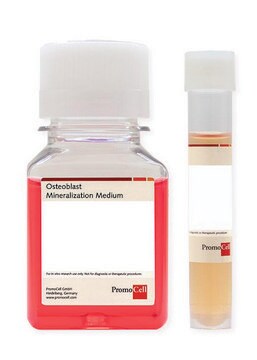406-05A
Human Osteoblasts: HOb, adult
Synonym(s):
Hob cells
Sign Into View Organizational & Contract Pricing
All Photos(2)
About This Item
UNSPSC Code:
41106514
NACRES:
NA.81
Recommended Products
biological source
human bone (normal)
packaging
pkg of 500,000 cells
manufacturer/tradename
Cell Applications, Inc
growth mode
Adherent
karyotype
2n = 46
morphology
osteoblast
technique(s)
cell culture | mammalian: suitable
relevant disease(s)
arthritis; osteoporosis
shipped in
dry ice
storage temp.
−196°C
General description
Lot specific orders are not able to be placed through the web. Contact your local sales rep for more details.
HOb are isolated from fetal or adult human bones. Additionally, osteoblasts from osteoarthritis or rheumatoid arthritis donors are available. Human osteoblasts provide an excellent model system for studies relevant to the skeletal system.
Characterization: Positive for bone mineralization.
Human osteoblasts have been used to:
HOb are isolated from fetal or adult human bones. Additionally, osteoblasts from osteoarthritis or rheumatoid arthritis donors are available. Human osteoblasts provide an excellent model system for studies relevant to the skeletal system.
Characterization: Positive for bone mineralization.
Human osteoblasts have been used to:
- Characterize signaling pathways mediating bone morphogenesis, such as identify human Crossveinless-2 as an inhibitor of BMP (Binnerts, 2009); demonstrate crosstalk between Runx2, Osterix, and NELL-1 (Chen, 2011); identify TWEAK as a cytokine regulating RANTES production, BMP-2-induced differentiation, and RANKL expression in osteoblasts (Ando, 2006)
- Demonstrate that Kobophenol A enhances proliferation of osteoblasts via activation of the p38 pathway (Kwak, 2013) and clarify the relationship between hypertension and osteoporosis by demonstrating that Ang II activates osteoclasts via RANKL induction (Shimizu, 2008, 2012)
- Identify adiponectin as an activator of IL-6, IL-8, VEGF and MMPs in endothelial cells and osteoblasts, implicating it in the development of arthritis (Lee, 2014)
- Show that inhibition of NF-κB prevented the progression of bone loss in periodontitis and promoted the wound healing in bone defects through the inhibition of osteoclasts (Shimizu, 2009)
- Study active compounds from Uraria crinita for their potential to stimulate bone formation and regeneration (Mao, 2014)
- Investigate properties of osteosarcoma, including the role of fluid pressure in angiogenesis (Nathan, 2008) and novel oncogenes (Both, 2012); and develop better treatment strategies (Ma, 2011)
- Develop optimal materials, coatings and drug delivery techniques for orthopedic implants and tissue engineering (Frandsen, 2014; Ni, 2012; Pilia, 2013a, b, 2014; Shiels, 2012; Valente, 2012; Zhang, 2010, 2011)
Cell Line Origin
Bone
Application
model for skeletal system research, signaling pathways, bone morphogenesis, gene expression, cell activation and proliferation, wound healing, bone formation and regeneration, treatment strategies, tissue engineering, in vitro bone models, mineralization, hormone treatments
Components
Basal Medium containing 10% FBS & 10% DMSO
Preparation Note
- 2nd passage, >500,000 cells in Basal Medium containing 10% FBS & 10% DMSO
- Can be cultured at least 10 doublings
Subculture Routine
Please refer to the HOb Culture Protocol.
Disclaimer
RESEARCH USE ONLY. This product is regulated in France when intended to be used for scientific purposes, including for import and export activities (Article L 1211-1 paragraph 2 of the Public Health Code). The purchaser (i.e. enduser) is required to obtain an import authorization from the France Ministry of Research referred in the Article L1245-5-1 II. of Public Health Code. By ordering this product, you are confirming that you have obtained the proper import authorization.
Storage Class
11 - Combustible Solids
wgk_germany
WGK 3
flash_point_f
Not applicable
flash_point_c
Not applicable
Certificates of Analysis (COA)
Search for Certificates of Analysis (COA) by entering the products Lot/Batch Number. Lot and Batch Numbers can be found on a product’s label following the words ‘Lot’ or ‘Batch’.
Already Own This Product?
Find documentation for the products that you have recently purchased in the Document Library.
Customers Also Viewed
Kiruthika Lawton et al.
International journal of nanomedicine, 14, 7947-7962 (2019-10-22)
Hydroxyapatite (HA) is a biologically active ceramic which promotes bone growth, but it suffers from relatively weak mechanical properties. Multi-walled carbon nanotubes (MWCNTs) have high tensile strength and a degree of stiffness that can be used to strengthen HA; potentially
Our team of scientists has experience in all areas of research including Life Science, Material Science, Chemical Synthesis, Chromatography, Analytical and many others.
Contact Technical Service

